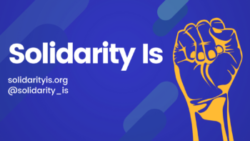Nov
20
2019
Written by Deepa Iyer
Reflect for a moment. Have you attended a protest, a rally, or a march in the past year? Have you used a hashtag online to indicate your support for a social movement? If you have, you’re not alone. More and more, people around the world are expressing their solidarity for causes and communities because of a fundamental belief that systems of oppression must give way to more equitable and caring societies.
Through a project called Solidarity Is, I have been exploring how solidarity practice can be an effective strategy to build power, inclusion, and equity. It’s true that we act regularly in support of issues and ideas that we believe in, even when we don’t belong to the communities at the center of a movement. But here is the more interesting observation: there is a significant likelihood that social change causes are successful, and more quickly so, when people engage in transformative solidarity practices.
The word “transformative” is important because it signifies a change, an evolution, and a maturation. Contrast this with a transactional practice, which begins and ends with the action. For example, transactional solidarity happens when I go to a march to support an action organized by my city’s Black Lives Matter chapter, and then return home to post pictures with the hashtag #BlackLivesMatter. There is indeed validity in my action: I was motivated to do something about anti-Black racism in my town; my presence at the march made it a more robust one; and I let my networks know that I care.
But, transformative solidarity can stretch me – and the cause – further. Here’s what that could look like: I persuade two friends to go to the march with me. I engage in a personal educational process to learn about the historical and ongoing effects of white supremacy. I organize a session in the race/faith community I belong to about how we too perpetuate anti-Black racism and why we must stop. I build relationships with Black Lives Matter leaders in my city to extend my support. I show up time and again for the events they hold with new people in tow who take similar actions. Meanwhile, the Black Lives Matter chapter has been continuing its work to deepen its base and to hold workshops and forums that center affected communities. With the support of a diverse range of stakeholders, the chapter successfully moves a policy platform forward over time.
Transformative solidarity can take us much further and faster to our intended goals than transactional practices. In the second example, my actions have the possibility to create meaningful changes in myself, the community I belong to, and even the broader cause. Transformative solidarity often requires discomfort and disruption – and a certain level of personal risk. Tackling anti-Black racism within my own community could be risky but the possible outcomes are well-worth it. Transformative solidarity practice also depends on building relationships with others, which can often be messy and uncomfortable as people work through differing strategies and political ideologies together. And, transformative solidarity motivates us to change internally as well, in terms of our understanding, our viewpoints, and our commitments.
Transactional solidarity is more like being a spectator and a bystander or a mildly interested participant. Transformative solidarity requires us to challenge ourselves rather than stay in comfortable bubbles, to figure out what we are willing to risk, to deepen relationships rather than walk away when they become hard, to commit for the long-term, and to disrupt the status quo.
Our individual steps towards transformative solidarity can contribute to the large-scale mobilizations we see around the world today. Here are prompts you can utilize if you would like to deepen your own solidarity practice:
- Do I know enough about the cause/communities I want to support? How can I learn more?
- What relationships do I have with those engaged in the cause? How can I deepen these?
- What is my point of entry into the cause I’d like to support? What systems of power are being addressed – and what’s my own stake?
- Are there ways I can use my privileges to disrupt the status quo or to be in service to those who are leading the cause?
- How am I changing in terms of my understanding and orientation to power and to social change?
You can also learn more by joining Solidarity Is and people around the country who are experimenting with transformative solidarity practices. You can:
- Contact us for workshops, trainings, and facilitation around solidarity frameworks and practices. (Request here)
- Apply to be part of the 2020 Solidarity School (applications available in early 2020).
- Listen to and learn from the Solidarity Is This podcast which features people who are utilizing solidarity as a strategy for social change. (Subscribe here)
- Follow @solidarity_is on Twitter to take part in social media townhalls about solidarity practice.
Deepa Iyer is a Senior Advisor at Building Movement Project where she manages Solidarity Is. Contact Deepa at diyer@buildingmovement.org.


One thought on “Beyond Hashtags and Slogans: When Solidarity Becomes Transformative”
Comments are closed.